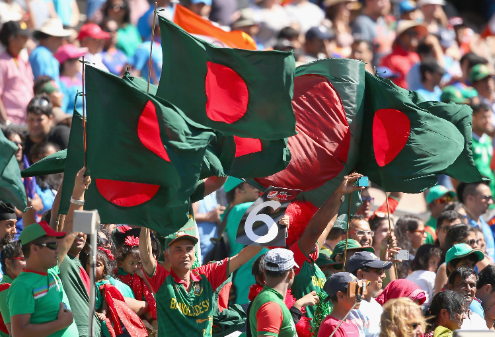Read the runes
Growing Bangladeshi support for Pakistan is an emerging concern that requires immediate solution

It seems that November hasn't been good for Bangladesh this year. Starting with cricket, the gentlemen's game, it can be said that sportsperson spirit is waning in the sport across the Indian sub-continent — particularly in matches involving India, Pakistan and Bangladesh. Recently, a Bangladesh-Pak T20 match — hosted by Bangladesh — aroused controversy. A large number of Bangladeshi spectators at Mirpur stadium, Dhaka, wore Pakistan team jerseys and even carried Pakistani flags. This, certainly, did not augur well with the Bangladeshi liberals, supporters of India, and anti-Pakistan and non-communal lobbies.
Such brazen support for Pakistan — particularly when Bangladesh is celebrating 50th year of its independence from Pakistan and the centenary of its most beloved leader, Sheikh Mujibur Rahman — is unsettling. Former Bangladesh captain Mashrafe bin Murtaza took to social media last Friday saying that while good sport should be appreciated, it is really painful to see that an adversary country's flag is waved in the galleries. Angry Mashrafe instead called for fluttering of Bangladeshi flags everywhere in the stadium, accompanied with vibrant cheers for Bangladesh. Despite Mashrafe's critical remarks, many Bangladeshi spectators were still noticed cheering Pakistan. A former Pakistani cricketer, who had toured Bangladesh in 2018, admitted that the massive support for Pakistan was unprecedented. He added that at times it would appear that the match was being held in Pakistan and not in Bangladesh
Pro-liberation forces have described such acts as treason — demanding immediate arrest and punitive actions. Many in Bangladesh are even asking how could a 50-year-old independent nation forget the atrocities perpetrated by the Pakistani occupation forces which are now emboldened to act at the prompting of pro-Pakistani lobbies to recruit mercenaries, infiltrate them inside the stadium and reignite the sparks of Pakistani and communal influences in Bangladesh.
These happenings point towards a definite pattern through which Pakistan and its intelligence services are hellbent to destroy the prevailing secular fabric of Bangladesh. It won't be out of context to mention that there has been an increase in disturbing activities within Bangladesh in its golden jubilee year. It is also not coincidental that soon after the Indian PM wound up his Dhaka visit March this year, a slew of communal disturbances and destruction of Hindu properties took place. Furthermore, the previous month only, we saw vandalising of nearly 70 Durga Puja Pandals in various parts of Bangladesh, as also the grabbing of Hindu property from the impoverished lot. Evidently, India is indeed one of the countries being targeted by proxies, possibly backed by Pakistan, to make a dent in the excellent Indo-Bangladesh relations and communal amity in Bangladesh.
In addition to these unwelcoming developments, the opposition party, Bangladesh Nationalist Party (BNP), has suddenly stepped up its activities. Their one-point lame agenda is to demand for their party leader Khaleda Zia to be sent abroad for medical treatment. It may be recalled that Khaleda Zia — not particularly favourable towards India during her stint as PM — is suffering from multiple ailments. In the meantime, BNP detractors appear convinced that the blueprint for such anti-Bangladesh activities is planned in London by Khaleda's son, Tarique Rahman, in cahoots with the Pakistani intelligence and banned Jamaat-e-Islami. Part of such planning and execution shows rising cases of pro-Khaleda demonstrations in some parts of Bangladesh. On November 22, the port town of Khulna saw violent clashes between the police and the BNP protestors. BNP wants to prove its presence as a political entity all over Bangladesh. The Bangladeshi government and the authorities, on ground, should not take such happenings lightly and instead act effectively to nip the problem in the bud so that it does not slip out of control.
In another recent Bangladesh-related development, 34 Rohingya camps in Cox's Bazar became violently active due to the presence of the Arakan Rohingya Solidarity Army (ARSA). This has been confirmed by unnamed intelligence sources within Bangladesh. ARSA is well-known for its close nexus with the Pakistani ISI. Such a tie-up was first noticed in August 2017 when the Rohingyas were pushed by Myanmar Army into Bangladesh, following ARSA's armed intervention in harming the Myanmar Army. ARSA is also involved in drug trafficking, gun running, radicalisation and extortion. They run at least 500 Madrasas in the Rohingya camps controlled by the ARSA-supported Ulama Council. These recent activities have provided enough food for thought for the Bangladeshi authorities to contain the rising menace.
These happenings are particularly critical as the most significant and sacred Victory Day (December 16) — remembering dismemberment of Pakistan and creation of an independent Bangladesh — is only a fortnight away and celebrations are afoot in India as well, with Indian leaders reiterating excellent relations with Bangladesh. Under no circumstances, such a status should be allowed to be undermined, with Pakistan having the luxury to act as a spoiler.
The writer is a retired IPS officer, a security analyst and a former National Security Advisor to the PM of Mauritius. Views expressed are personal.



